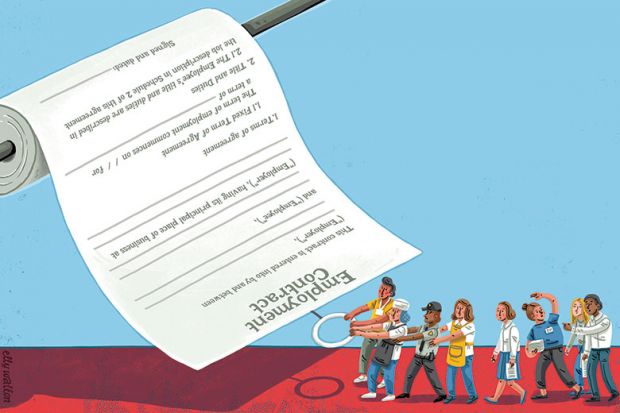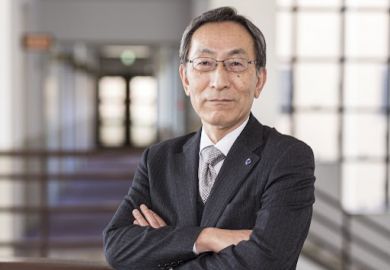Earlier this year, academics across the UK went on strike to defend their pensions. Thousands braved snow and icy rain on the picket lines. After 14 days they beat back the worst of the proposed changes to the Universities Superannuation Scheme. Try to imagine the same battle over casualisation and, like me, you will probably draw a blank.
Like their counterparts all over the world, British universities have, over the past 20 years, steadily dumped as much teaching as possible on academics working on a variety of short-term and casual contracts. Official figures regarding this trend have been curiously sparse, with the UK’s Higher Education Statistics Agency, up until last year, not compiling data on how many hourly paid or zero-hours staff were on university books. However, a University and College Union (UCU) report in 2016 found that almost half of teaching staff at UK universities were on “insecure” contracts. That figure is disputed by employers, but it is beyond argument that the careers of many young academics – such as myself – now begin with a long span of insecure work on low pay.
Casualisation generates plenty of outrage, expressed in blogs, social media posts and the pages of Times Higher Education. The UCU now has an anti-casualisation committee, and the issue is plastered over the union’s website. Here and there, casual staff form groups to win small improvements in pay and conditions, and shave some of the rougher exploitative edges off their contracts. Their work has been important, even crucial, but it is not enough by itself to bring casualisation to an end.
Only one in 10 UK vice-chancellors who responded to THE’s recent global University Leaders Survey on the future of higher education expects casualisation to increase between now and 2030, compared with nearly three-quarters who do not. And some universities, it is true, are beginning to pare back some kinds of short-term contracts. Yet there are few signs that university managers will reverse on their own initiative a trend that they themselves put in train. And it is worth noting that UK leaders’ views are very much the exception: across the globe, nearly half of respondents expect casualisation to increase, compared with less than a third who don’t.
There is certainly no prospect that, as some people assert, the casualised system will collapse on its own as stress and underpay drive down the quality of teaching and wreck the reputation of UK higher education. For every casual teacher who can’t cope and drops out, new PhDs come through to replace them. They, not the system, snap first.
To end this trail of broken careers, those of us on casual contracts need to think again about the ways and means to redress our grievances.
We don’t even have to look beyond the campus gates for inspiration. Over the past few years, cleaners, caterers, security guards, porters and other people who keep UK universities clean, fed and secure have taken action to improve their own lot. At the London School of Economics, the University of London and other institutions, they have won the London living wage, better holiday and sick pay and the reversal of job cuts.
Some of these victories have been won through new, small unions, such as the Independent Workers of Great Britain, United Voices of the World and the Cleaners and Allied Independent Workers Union. Some have come through larger, more established unions such as Unison and Unite, or older independent ones such as the Industrial Workers of the World. What unites all of them is the determination to make invisible workers visible.
They have protested, gone on strike and won support from students. By banging drums and causing a fuss they have achieved more than they would have done had they merely trusted to the goodwill of universities.
And they have done all this without the advantages enjoyed by academics on casual contracts: platforms to write and make themselves heard. Casual teachers should take note. We might not be invisible, but the terms of our employment are. We must make those terms visible to our students in a way that university administrations can’t ignore.
If that means protests, even strikes or other forms of action, then so be it. If the UCU will lead it, fine. If it means a new movement, or an arrangement with the new unions, that’s fine too. The only alternatives are to go on as before, or to hold out in the hope that we will each find our own way out of the casualised trap and into permanent work.
Other workers on campus don’t have that hope. That, perhaps, is part of the secret to their success. They harbour no illusions about some pleasant alternative just out of sight: they have to make the best of the job they have now. And we must follow them. Because while the status quo might be sustainable for universities, it is not for us.
Steven Parfitt is a teaching fellow in history at Loughborough University.




